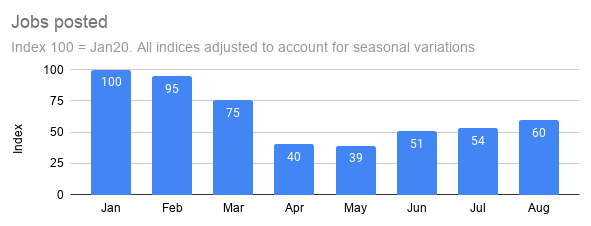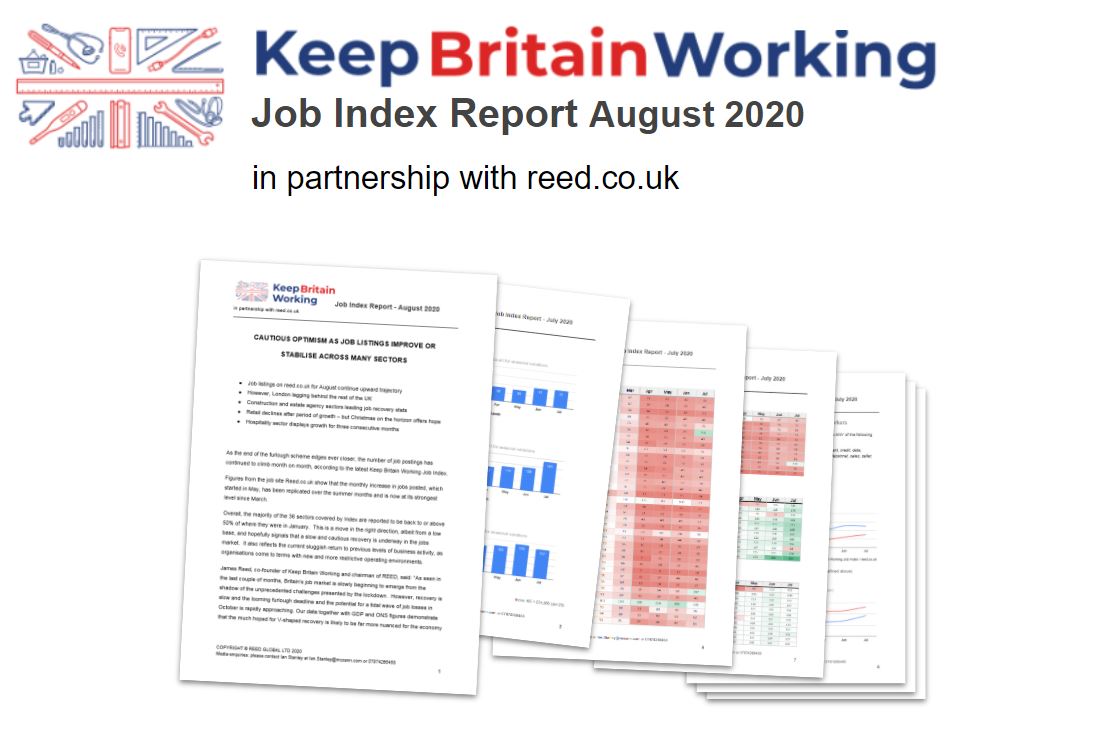As the end of the furlough scheme edges ever closer, the number of job postings has continued to climb month on month, according to the latest Keep Britain Working Job Index. Link to download report at bottom of page.
- Job listings on reed.co.uk for August continue upward trajectory
- However, London lagging behind the rest of the UK
- Construction and estate agency sectors leading job recovery stats
- Retail declines after period of growth – but Christmas on the horizon offers hope
- Hospitality sector displays growth for three consecutive months

Figures from the job site Reed.co.uk show that the monthly increase in jobs posted, which started in May, has been replicated over the summer months and is now at its strongest level since March.
Overall, the majority of the 36 sectors covered by Index are reported to be back to or above 50% of where they were in January. This is a move in the right direction, albeit from a low base, and hopefully signals that a slow and cautious recovery is underway in the jobs market. It also reflects the current sluggish return to previous levels of business activity, as organisations come to terms with new and more restrictive operating environments.
James Reed, co-founder of Keep Britain Working and chairman of REED, said:
“As seen in the last couple of months, Britain’s job market is slowly beginning to emerge from the shadow of the unprecedented challenges presented by the lockdown. However, recovery is slow and the looming furlough deadline and the potential for a tidal wave of job losses in October is rapidly approaching. Our data together with GDP and ONS figures demonstrate that the much hoped for V-shaped recovery is likely to be far more nuanced for the economy in general, and the job market prospects of sectors will continue to show winners and losers to various degrees.
“As I have previously mentioned, there is a major concern for the young and the low paid in this economic recovery. The rising average salaries we are seeing for jobs advertised are falsely inflated because of the removal of lower paid jobs, not higher salaries being paid. As companies embark on price wars to win back customers there is real concern that wages could face a downward pressure. If we are to have a level, sustainable economy that works for everyone then jobs must be created in all sections of society and the tax burden must be evenly shared. Until that happens we will not be on the true road to recovery.”
Rhys Harris, associate director – engineering, process & construction at fellow Keep Britain Working member, Morson Group:
“Clear gains in the construction and property market is also mirrored in our own data at Morson, with contractor numbers doubling within our construction & civil infrastructure markets since April. Growing demand for blue, and white, collar workers, from bricklayers through to site managers and quantity surveyors, provides a major boost to the UK economy. The PM’s promise to ‘Build, Build Build’ and put jobs and infrastructure at the centre of the country’s growth is a sensible step to get the economy moving again. The construction industry contributed up to 10 per cent of GDP in pre-COVID figures and its swathes of major players and their supply chains – many of whom are SMEs and family businesses – provide a vital contribution to our recovery.
“At its peak, the pandemic was fast-moving and largely unpredictable, with many employers now recognising the importance of having a strategic outlook on the procurement of talent in a bid to regain control of their workforce, provide access to key worker information and deliver cost efficiencies – particularly those with large contractor populations. Without a managed service provider (MSP) to deploy the correct corporate governance and compliance processes, an organisation lacks key management information and the ability to efficiently flex and scale their talent acquisition function; with the looming IR35 private sector reforms and Brexit only adding more fuel to the fire in what is the ‘perfect storm’.
“Employers need to reassess how they build pipelines which reach, recruit and retain the best workers, whilst developing and deploying a strong employer value proposition (EVP) that defines who they are and delivers exceptional candidate journeys. There are unprecedented numbers of active candidates in the construction market – levels that we may never see again in our lifetime – which provides a unique opportunity for organisations to cut through the noise, lock in the best talent and put themselves ahead of their competitors.”







